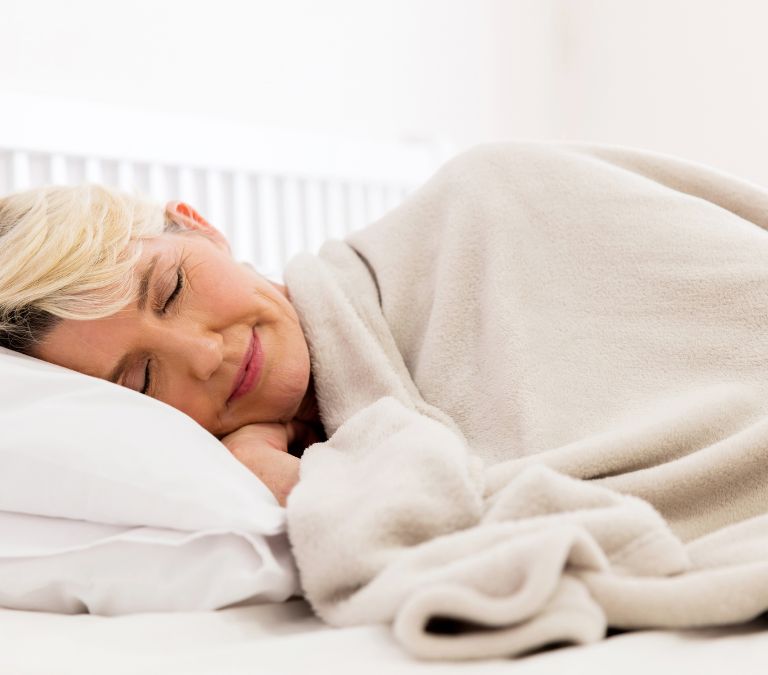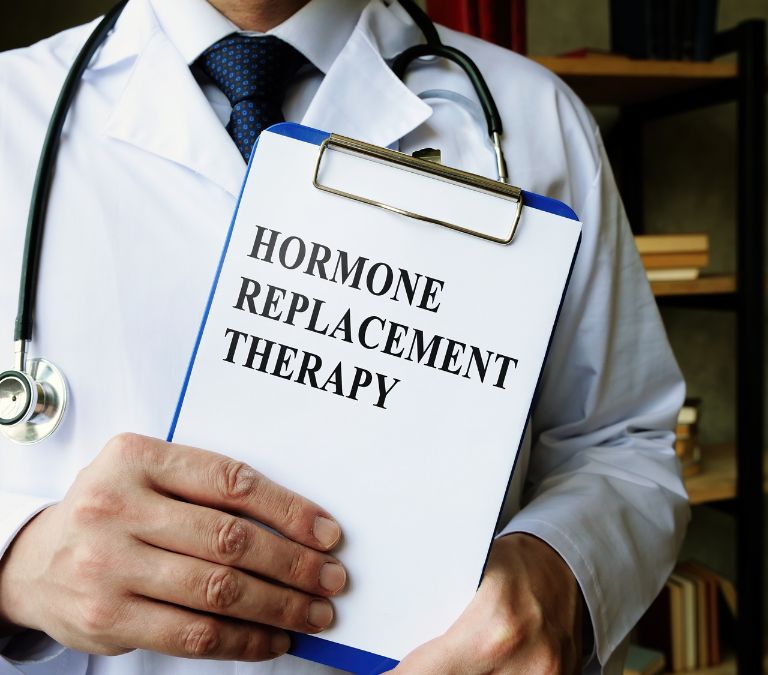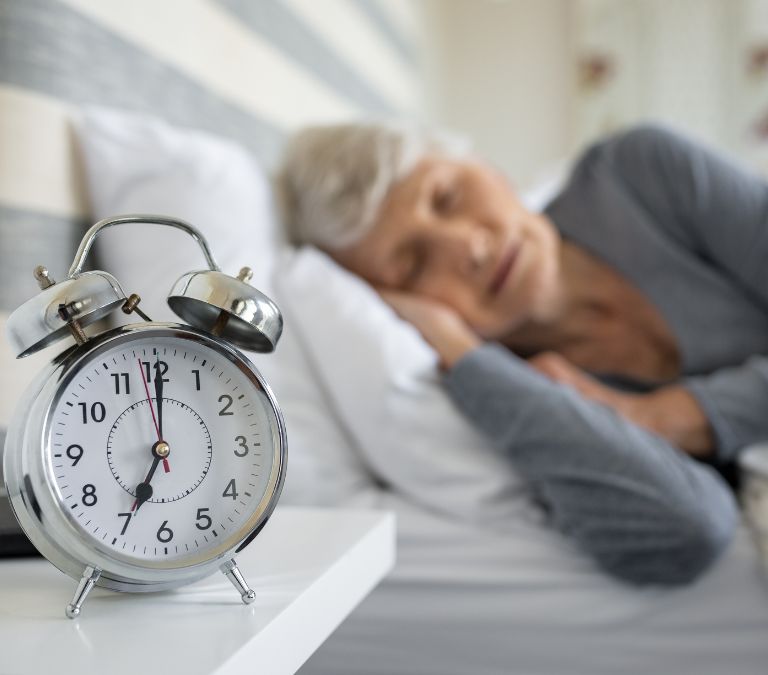How often do you wake up at night to urinate? Never or only once? If you’ve reached menopause, that number can be much higher due to nocturia, a condition that makes you wake up repeatedly urinate.
What exactly is nocturia? It is a condition in which you wake up in the middle of the night to urinate. It is referred to as nocturnal urinary frequency, or the need to urinate more frequently at night. This condition becomes much more common as people age and affects men and women for various reasons.
Most people wake up once during the night to urinate, but urinating more recurrently may indicate something else is wrong. Rapid changes in hormone levels characterize menopause. Let’s further break down this topic below.
What are Hormones?
Hormones are “chemical messengers” that your body uses to regulate vital functions such as metabolism, menstrual cycles, sleep, and others. As a result, menopausal changes in hormone levels can significantly impact various aspects of your body’s biology. Consider the hormone melatonin.
Melatonin is a hormone your body secretes into your bloodstream to help you maintain a regular sleep-wake cycle. However, as you get older, your body produces less and less melatonin. The melatonin, coupled with decreasing estrogen levels, could lead to experiencing sleeping problems like nocturia. Some women’s sleep disturbances may be temporary without any accompanying distress, meaning hormone replacement therapy might not be necessary.
On the other hand, other women may suffer from severe sleep disturbances that considerably impact their quality of life. Sleep disruptions with this severity would require hormone replacement therapy.
How Much Sleep Do You Need?

The majority of adults require at least 7 hours of sleep per night. However, more than one-third of American adults report not getting the recommended amount of sleep. While this may be alright for a day or two, not getting enough sleep over time can lead to serious health problems—or exacerbate existing health problems.
Health Conditions Linked to a Lack of Sleep?
Sleeping for less than seven hours every night will likely lead to health issues such as asthma, a heart attack, or depression. Some health issues increase the risk of heart disease, heart attack, or stroke. Among these health issues are:
- High blood pressure
Your blood pressure drops during normal sleep. When you don’t get enough sleep, your blood pressure rises for a longer period. High blood pressure affects approximately 75 million Americans, or one in every three adults.
- Diabetes
Diabetes causes sugar to accumulate in your blood, causing damage to your blood vessels. According to some studies, getting enough good sleep may help people improve their blood sugar control. Type 2 diabetes is a chronic ailment in which the blood sugar level, also known as blood glucose, is abnormally high due to the body’s inability to process sugar properly.
Excess blood glucose damages blood vessels, harming cardiovascular health. Diabetes patients are twice as likely as non-diabetics to die from heart disease or stroke. Many factors influence blood sugar levels, but studies have shown that a lack of sleep impairs glucose metabolism. Sleep deprivation is linked to prediabetes.
- Obesity
Obesity is particularly true for kids and teens, who require more sleep than adults. Lack of quality sleep can harm the part of the brain that regulates hunger. Obesity and being overweight are closely related to various cardiovascular and metabolic issues, including hypertension, diabetes, high cholesterol, heart disease, heart attack, and stroke.
Obesity has been linked to a lack of sleep. People who sleep less than seven hours each night are more likely to have a higher BMI or be obese. Sleep regulates the hormones that control hunger, and a lack of sleep or sleep disturbances can lead to overeating and an increased desire for high-calorie foods.
Proper sleep is essential for good health. Getting enough rest also allows you to function normally during the day. The majority of us need at least seven hours of sleep per night.
What is Hormone Therapy?
Your ovaries do not produce high levels of estrogen and progesterone as you enter menopause. Changes in these hormone levels can result in unpleasant symptoms. Common menopausal symptoms include:
- Hot flashes
- Sweating at night or cold flashes
- Vaginal dryness; sex discomfort
- Having a strong desire to pee (urinary urgency).
- Sleeping problems (insomnia).
- Swings in overall mood, mild depression, or irritability.
- Excessive dryness of the skin, eyes, or mouth.
Hormone therapy is used to increase hormone levels and alleviate some of the symptoms of menopause. Whether or not you should consider hormone replacement therapy is something you should discuss with your healthcare provider. There are numerous health benefits and risks associated with hormone replacement therapy.
Estrogen replacement therapy enhances sleep quality by reducing frequent nighttime awakenings and vasomotor symptoms. When vasomotor symptoms, depressive symptoms, osteoporosis, vaginal dryness, nocturnal awakenings, and sexual dysfunction are reduced, postmenopausal women’s sleep quality improves.
As a result, hormone replacement therapy is a recommended treatment for menopausal insomnia, as it improves sleep quality and overall quality of life.
What are the types of menopausal hormone replacement therapy?
Menopausal hormone replacement therapy is classified into two types:
- Estrogen Replacement Therapy
This treatment entails taking only estrogen. With or without progesterone, estrogen therapy is very effective in treating vasomotor symptoms (decreasing hot flushes) and thus improving your quality of sleep. Hormonal replacement therapy is a majorly recommended treatment for osteoporosis, sexual dysfunction, mood, and depression. Take the smallest amount of estrogen necessary to relieve menopausal symptoms and prevent osteoporosis.
- Estrogen & Progesterone Hormone Therapy
This hormonal therapy is also known as combination therapy. Combination therapy combines estrogen and progesterone doses (or progestin, a synthetic form of progesterone).
The primary goal of hormonal replacement therapy is to treat symptoms caused by a lack of estrogen. However, in the case of sleep disruptions, the addition of progesterone may be beneficial.
Utrogestan, which is natural progesterone, typically taken orally at night, can cause drowsiness and aid in sleep induction (although the effect depends on the dosage, and how it is metabolized varies from person to person). In addition, progesterone is also linked to increased non-REM (Rapid Eye Movement) sleep, which is essential for health.
Ways of taking hormonal replacement therapy

- Tablets
Tablets are one of the popular types of hormonal replacement therapy you can partake in. They are typically taken once per day. Tablets are available for both estrogen-only and combined hormonal replacement therapy. Furthermore, ingesting tablets may be the most convenient way to receive treatment for some women.
However, some of the risks of hormonal replacement therapy, such as blood clots, are greater with tablets than with other forms of hormonal replacement therapy (although the overall risk is still small).
- Skin patches
Hormonal replacement therapy is also commonly administered via skin patches. All you have to do is apply them to your skin and change them every few days. There are estrogen-only and combined hormonal replacement therapy patches available.
If taking a tablet is inconvenient, skin patches may be a better option than tablets. Additionally, patches can help you avoid some negative side effects of hormonal replacement therapy, such as indigestion. Unlike tablets, skin patches don “t increase your risk of blood clots.
- Estrogen gel
Estrogen gel is a growingly popular type of hormonal replacement therapy. It is applied to your skin once a day. Gel, like skin patches, is a convenient way to take hormonal replacement therapy that does not increase your risk of blood clots. However, if you still have your womb, you must take a progestogen separately to reduce your risk of womb cancer.
- Implants
Hormonal replacement therapy is also available in small pellet-like implants inserted under your skin (typically in the tummy area) after your skin has been anesthetized. The implant gradually releases estrogen and lasts several months before needing to be replaced.
It may be a convenient option if you don’t want to worry about taking your medication daily or every few days. However, if you still have your womb, you must take progestogen separately. Keep in mind that if you’re taking a different type of estrogen and need to take progestogen, an intrauterine system is another implant option (IUS).
- Vaginal estrogen
Estrogen is also available in the form of a cream or vaginal ring. It can help vaginal dryness but not other symptoms like hot flashes and night sweats. It does not have the usual risks associated with hormonal replacement therapy and does not increase your risk of breast cancer, so you can use it without taking a progestogen.
Does Hormonal Replacement Therapy Reduce Nocturia?
As we’ve already established, during menopause, your ovaries stop producing estrogen. That hormone is essential for women because it initiates puberty, regulates your menstrual cycle, and is present during pregnancy. When it’s gone, your body can relax after working so hard through all of these stages. You may already know that this transition is accompanied by hot flashes, night sweats, and mood swings.
Nocturia is caused by estrogen loss, which causes bladder dysfunction, night sweats, sleep disorders, and changes in kidney function. According to sleep experts, we should get at least seven hours of sleep per night.
Sleeping for less than six hours every night is detrimental to your health. Furthermore, stress from work, traveling, and other sleep disruptions increase your risk of developing cardiovascular disease and its risk factors, such as diabetes and obesity.
Sleep deprivation can cause high blood pressure in teenagers and adults. Sleeping for an inadequate period leads to a higher risk of high blood pressure. Furthermore, sleep deprivation could worsen your high blood pressure if you already have the condition. Sleep is thought to help your body regulate stress and metabolic hormones.
Additionally, inadequate sleep could lead to hormonal swings and other risk factors for heart disease. We advise you not to compensate for inadequate sleep by sleeping a lot. Sleeping too much can cause weight gain, harming your heart’s health. Consult an experienced doctor for sleep-improvement advice, especially if you already suffer from this condition.
Obstructive sleep apnea could be the culprit. This condition increases your likelihood of developing high blood pressure and cardiovascular issues. Hormone replacement therapy will increase your estrogen levels and reduce these sleeping disorders, improving the quality of your beauty sleep.
According to a study, 63 postmenopausal women joined a 7-month study involving the administration of two 3-month treatments with estrogen and placebo with a 1-month washout period between.
Hormone replacement therapy improved sleep quality, made it easier to fall asleep, and reduced nocturnal restlessness and awakenings. When the women were given estrogen replacement therapy, they felt less tired in the mornings and during the day.
Estrogen-induced sleep improvement was followed by relief of vasomotor symptoms and mood improvement. Hormonal replacement therapy reduced sleep complaints in postmenopausal women significantly.
Conclusion
Hormonal replacement therapy has proven to be the most effective remedy for curbing nocturia. You could consider opting for combination therapy because it incorporates progesterone, which helps with sleeping disorders like nocturia. Menopause isn’t always the cause of urinary incontinence.
Your muscles may have naturally weakened as you’ve gotten older. Alternatively, you may have suffered injuries due to giving birth to a child or several children. People who have nocturia may consider it an annoyance in their lives. It could even be considered humiliating.
Fortunately, numerous treatment options are available. There are even some lifestyle choices and habits that can help alleviate symptoms. Consider any medications you are taking. Remember to also reach out to your doctor or specialist to discuss any further questions you might want to ask.







